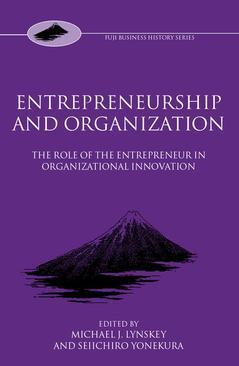Entrepreneurship and Organization The Role of the Entrepreneur in Organizational Innovation Fuji Business History Series
Langue : Anglais
Coordonnateurs : Lynskey Michael J., Yonekura Seiichiro

Entrepreneurship is at the top of the social, political, and economic agenda. It is seen as essential to economic growth and, as a result, policy-makers worldwide are devising strategies that encourage and promote entrepreneurial activity. However, despite the importance attached to entrepreneurship in innovation and economic growth, the entrepreneur remains a strangely elusive and intriguing character. While entrepreneurship has been examined previously from the standpoint of various disciplines such as economics and sociology, this volume focuses on entrepreneurship and the entrepreneurial organization from a business history perspective. Well-known international scholars place entrepreneurship in recent historical context and explore organizational innovation in firms from different sectors in America, Europe, and Japan. The coverage spans the entire twentieth century, from the beginnings of the radio communications industry in Europe to the computer networking industry of Silicon Valley, and includes chapters on Bill Gates and Microsoft, corporate renewal in Sony and Samsung, and R&D and leadership succession in large British companies, such as Glaxo, Courtaulds, and Unilever. Other chapters throw light on companies and sectors that are perhaps unfamiliar to English-language readers, such as the German retailing sector, the Spanish motor industry, and Japan's video game business. Three broad themes are addressed in the volume. The first examines the role of the entrepreneur in the creation of new firms and industries, arguably the raison d'être of the entrepreneur. It does so by looking at entrepreneurship in five separate sectors in different countries. The second theme addresses the institutional and organizational factors facilitating entrepreneurship and innovation, for example the role of the venture capital industry, the 'hiving-off' process of entrepreneurship, and corporate renewal by internal entrepreneurship. The final theme investigates entrepreneurship in periods of transition, looking in particular at organizations in Britain and Japan to illustrate examples of corporate success and failure in making transformation.
Seiichiro Yonekura and Michael J. Lynskey: Introduction, Part. Part 1: Entrepreneurs and the Creation of New Businesses and Industries. 1: Pascal Griset: Entrepreneurs and Organization in the Radio Communications Industry, 1896-1920s, 2: Heidrun Homburg: The First Large Firms in German Retailing - Department Store Chains from the 1920s to the 1980s: Structures, strategies, and management, 3: Albert Carreras and Salvadore Estate-Triay: Entrepreneurship, Organization, and Economic Performance among Spanish Firms, 1930-1975: The case of the motor industry, 4: Hiroyuki Yoshida: The Development of Nintendo's Home Video Game Business: On merging tradition with innovation, 5: Michael A. Cusumano: Software Business Entrepreneurship: Lessons from Bill Gates and Microsoft, Part. Part 2: Institutional and Organization Factors Facilitating Entrepreneurship and Innovation. 6: Urs von Burg and Martin Kenney: Venture Capital and the Establishment of the Local Area Networking Industry in Silicon Valley, 7: Juro Hashimoto: The Cast-Off Mechanism of Larger Japanese Companies, 8: Dong-Fung Cho: The Environment-Creating Mechanisms of a Firm - A Road to Sustained Survival and Growth: Case studies of Sony and Samsung, Part. Part 3: Entrepreneurship in Periods of Transition. 9: Sally M. Horrocks: Organizing for Success? R & D in British Industry, 1945-c.1970, 10: Seiichiro Yonekura: Entrepreneurship in Organization: Transformational entrepreneurship at NEC, 11: Mary B. Rose: Entrepreneurial Legacies: Leadership succession in British business in the 1950s, Seiichiro Yonekura and Michael J. Lynskey: Afterword
Michael J. Lynskey is a Research Scholar at the Institute of Innovation Research (IIR), Hitotsubashi University, Japan. Previous positions have included Executive Consultant, Ernst & Young Management Consulting Division, London; Member, Executive Training Programme, European Commission, Brussels/Tokyo; Programme Executive, Xerox Corporation, European HQ, Marlow, Bucks.; and Senior Software Developer, General Electric. Seiichiro Yonekura is an Associate Professor at Hitotsubashi University where he teaches comparative business history. He is also holds visiting positions at a number of institutions including the University of Michigan, USA; Bocconi University, Italy; Lyon Business School, France; and the Catholic University of Louvain, Belgium. His current research interests are focused on (a) relationships between business development and innovation, (b) externalization strategy and organizational partition in hi-tech industry, (c) industrial policy and government-business relations, and (d) entrepreneurship and new business creation. He is Chief Editor of Hitotsubashi Business Review, is a regular commentator for the Japan Public Broadcasting Corporation (NHK) and Toyo Keizai on business and economic matters, and is a consultant to a large number of Japanese corporations.
Date de parution : 03-2002
Ouvrage de 404 p.
16.1x24 cm
Thèmes d’Entrepreneurship and Organization :
© 2024 LAVOISIER S.A.S.



